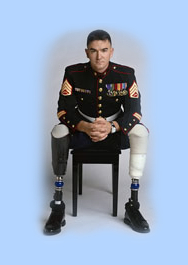"We're Going to Be Paying For This For a While": Soldiers Bring the War Home
By Jill Carroll, Christian Science Monitor. Posted July 16, 2008.
When veterans of wars in Iraq and Afghanistan bring their troubles home, police and judges often are the first to deal with them
During 21 years in the Marine Corps, Jeff Johnson saw young adults walk into his recruiting office and newly minted marines walk out of boot camp just a few months later. Now working at the other end of that pipeline at the Wisconsin Department of Veterans Affairs, he sees far different, troubling changes in those coming back from Iraq and Afghanistan.
"The changes were dramatic. I'd never seen these kinds of changes in people," says Mr. Johnson of those wrestling with the mental and physical trauma of war.
The once upstanding service members were getting arrested for domestic violence and bar fights, and being pursued by police as they raced along streets at 100 miles per hour -- often with drugs or alcohol involved -- seeking to replicate the adrenaline rush of combat or to commit suicide by motorcycle or police bullets.
He was moved to action, creating a presentation about the mental injuries of war for police and other first responders, usually the ones called when a veteran hits bottom.
A year later, he's delivered his message more times than he can count and he's been in demand from police departments across the country, hungry to prepare for what they worry is a coming surge of mentally injured veterans.
"A lot of them were getting in trouble with police. If [the police] know what resources are out there then they can funnel them into that," says Johnson, who has one son who is an Iraq veteran and another entering the service.
Police departments, veterans groups, and individuals from California to Colorado to Massachusetts are taking similar steps. At the other end of the criminal justice system, a "treatment court" in Buffalo, N.Y., dedicated to veterans opened this year.
The flurry of action is spurred by numbers like these: Some 40,000 cases of post traumatic stress disorder (PTSD) were diagnosed by the military among troops deployed to Iraq and Afghanistan from 2003 to 2007. The Rand Corp. estimates 300,000 troops are suffering from PTSD from those wars. Many mental-health experts expect those trends to continue, or even worsen, as the wars go on.
Police Sgt. George Masson in Riverside, Calif. -- home to many military families and near several bases -- shares those concerns. When he began his career in 1980, he encountered many troubled Vietnam War veterans. Almost 30 years later, those early experiences weigh on him.
"This is just the tip of the iceberg," says Sergeant Masson. "We're going to be paying for this for a while."
He helped organize a large, multi-agency training session this year focused on handling troubled veterans. Marines from nearby Camp Pendleton role-played such scenarios as hostage taking and suicide attempts. They invited mental health experts and combat veterans who suffered from traumatic stress to lecture.
Meanwhile, the San Francisco Police Department's crisis intervention team has added a segment on veterans to its training, says public information officer Sgt. Wilfred Williams.
Updated statistics are few, but a 2004 US Department of Justice report found 10 percent of all state and federal prisoners had served in the military, mainly during the Vietnam era. But about 4 percent were Iraq and Afghanistan veterans.
the rest
Saturday, July 19, 2008
Soldiers have dramatic emotional changes
Labels:
emotional,
iraq war,
jail,
mental anguish,
physical trauma,
police,
Soldiers,
suicide,
veterans affairs
Subscribe to:
Post Comments (Atom)
























No comments:
Post a Comment